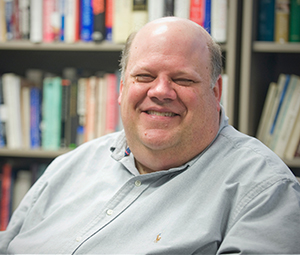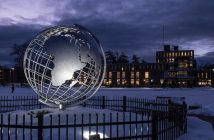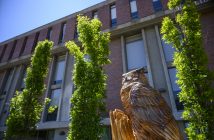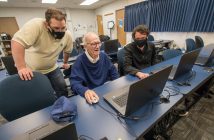Professor David Smailes thought he wanted to become a physician, but his strong curiosity about politics and history set him on a different journey of discovery and ultimately led him to teach at Westfield State University.
“By the time I graduated from high school, I had given up on medicine,” Smailes says. “When I arrived at the College of Wooster in Ohio, I dropped all the science courses from my first-year schedule and took political science and history courses –and found I really loved it.”
That love of history and politics earned Smailes a bachelor’s degree in political science in 1981 and a PhD from the University of Massachusetts in 1991.
Now in his seventh year at Westfield State University, Smailes teaches courses in American Politics, including Presidency and Congress, Political Change, American Public Policy and U.S. Politics in Film. Smailes came to the University from Regis College in Weston after teaching there for 16 years.
“Westfield State offered so many opportunities,” he says. “I wanted to teach at a larger institution, but I didn’t want to lose the opportunity to know my students and to be a part of campus life.
“Westfield offers a very rare combination of small classes with the advantages of a very active larger campus, all with a solid reputation for excellence in academics,” he adds. “I found I could truly have it all here.”
Smailes is hard-pressed to choose which class is his favorite to teach. “I’ve found that I really enjoy them all,” he says. “One of the great things about teaching political science is that the courses are always focused on current events, and I never teach a course quite the same way each time it is offered.”
This past fall semester was certainly focused on the excitement around Election 2012, which brought about great discussions in Smailes’ classes, leading up to the re-election of President Barack Obama.
“We’ve had discussions in my classes on the results of the election, both what it means for the future of a second Obama administration and exchanges within the Republican party about what it should do to improve the party’s future prospects,” Smailes says. “I think one of the most valuable things we have learned together is how to accept both political defeat and political victory and how to keep each in perspective.”
The presidential debates were popular for the American people to watch during the election season, and Smailes compared the debates to the Indy 500. “I think people watch them more for the political ‘crashes’ than for the debate itself,” he says.
Smailes says the fact that the country is so evenly divided in its politics indicates that compromise is a necessity for both sides. “After a long, hard-fought campaign neither side has emerged as a clear victor, which means neither side can claim a clear mandate for their policies.”
Smailes said there is no question that social media extended political dialogue in this election. “The ability of candidates to reach voters and to communicate directly with supporters is pretty profound,” he says. “It becomes another way traditional institutions, like political parties and the print/electronic media, are losing their monopoly on the political news we receive.”
During the election season, Smailes applauded students on campus for their engagement in the election, which says a lot about the current generation of college students who care about the future of our country.
“Politics can seem frustrating, but the desire to find out more about the issues and the candidates, and working toward solutions to problems, and the optimism that is reflected in the discussions I’ve had with students concerning our future is enough to make anyone confident that this new generation of leaders is going to have a lot to contribute to our civic society.”




